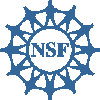
We are developing and assessing Quantum Interactive Learning Tutorials (QuILTs) for the advanced undergraduate courses.
The following features of the QuILTs make them particularly suited for the challenging task of teaching quantum physics:
Some QuILT modules expose students to contemporary and exciting topics such as quantum teleportation that can be taught using simple two-level systems.
The tutorial development goes through a cyclical iterative process that includes research on student difficulties in learning a particular physics concept, followed by the development, evaluation and refinement of the material. We are currently beta-testing several QuILT modules. If you are teaching quantum mechanics and would like to implement the modules in your class and provide us feedback, please send an email to clsingh@pitt.edu
A majority of the computer-based visualization tools for this project are being developed by M. Belloni and W. Christian at Davidson College under the Open Source Physics (OSP) project (see http://www.opensourcephysics.org/projects/packages/index.html)